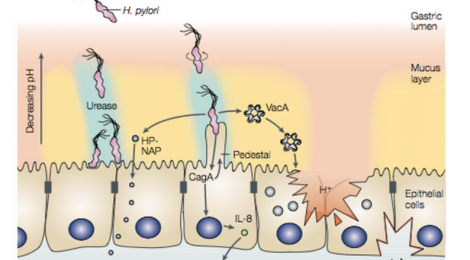
Another Link To IgAN With Coincident Infection
IgAN is well established as an auto-immune disease. Just how ones own immune system ends up damaging their kidneys is a topic both studied and debated.
In my view the issue is very simple. If you have the genetics that make you vulnerable to IgAN then your immune system, most certainly your thymus derived immune system, produces antibodies in response to infections and those antibodies attack both the infection and kidney membranes. The method of damage to kidney membranes results in those membranes becoming leaky, the first and persistent sign of this is leaking of proteins into urine.
Here’s a report just out that seems to confirm the infectious immune response very well. It clearly shows that when a chronic infectious agent, in this case one of the most chronic of all infectious pathogens H. pylori, which is the principal cause of ulcers and notoriously capable of staying put, is eradicated loss of protein in kidney patients significantly improves.
Given the trivial risk of the anti-biotic treatment to eradicate H.pylori and the very great benefit I am surprised that the authors of this paper did not come right out and state that people with kidney disease and proteinuria ought to consider staying clean with regard to H. pylori.
The Effects of Helicobacter pylori Eradication on Proteinuria in Patients with Primary Glomerulonephritis.
Author information
- 1Division of Pediatric Infectious Diseases, Department of Pediatrics, Istanbul Faculty of Medicine, Istanbul University, Istanbul, Turkey.
- 2Division of Nephrology, Department of Internal Medicine, Istanbul Faculty of Medicine, Istanbul University, Millet Caddesi, Capa, 34093 Istanbul, Turkey.
- 3Department of Pathology, Istanbul Faculty of Medicine, Istanbul University, Istanbul, Turkey.
Abstract
Background. Membranous nephropathy (MN) is a common cause of nephrotic syndrome. In most cases it is idiopathic, while it may also be secondary to many diseases. In this study, prevalence of H. pylori infection and the effects of H. pylori eradication on proteinuria levels were investigated. Methods. Thirty five patients with MN (19 male), 12 patients with IgA nephropathy (4 male) and 12 patients with focal segmental glomerulosclerosis (FSGS) (8 male) were studied. The presence of H. pylori antigen was investigated in renal tissues obtained by biopsy, and the effects of H. pylori eradication on proteinuria levels were investigated. Results. Immunohistochemistry with H. pylori antigen revealed no positive staining in the glomeruli of all patients. 19 patients (54%) with MN, 10 (83%) with IgA nephropathy and 4 (33%) with FSGS were positive for H. pylori stool antigen test (P = 0.045). Patients with H. pylori infection were administered eradication therapy (lansoprazole, 30 mg twice daily, plus amoxicillin, 0.75 g twice daily, plus clarithromycin, 250 mg twice daily, for 14 days). Before the eradication therapy the mean proteinuria of patients with MN, IgA nephropathy and FSGS were 2.42 ± 3.24 g/day, 2.12 ± 1.63 g/day and 1.80 ± 1.32 g/day, respectively. Three months after eradication, baseline proteinuria levels of patients with MN significantly decreased to 1.26 ± 1.73 g/day (P = 0.031). In all three groups there were no significant differences with regard to serum creatinine, albumin and C-reactive protein levels before and after eradication therapy. Conclusions. The eradication of H. pylori infection may be effective to reduce proteinuria in patients with MN, while spontaneous remission of MN could not be excluded in this patient cohort. This trial is registered with NCT00983034.
Recent Comments